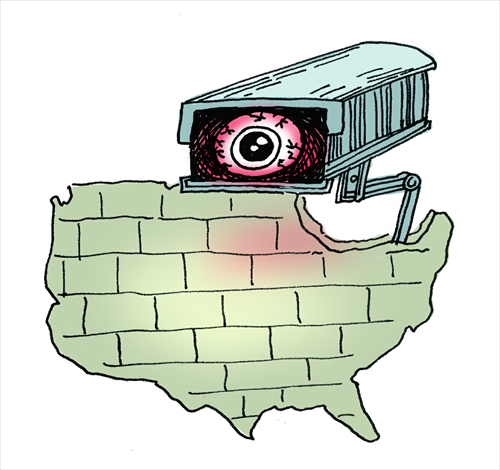HOME >> OP-ED
Expiry of Patriot Act is not end of Washington’s intrusive spying
By Zhong Sili and Kang Jing Source:Global Times Published: 2015-5-31 22:03:01

Illustration: Liu Rui/GT
Some provisions of the USA Patriot Act, the foundation of the massive US foreign and domestic wiretapping program and other controversial intelligence-collection operations, are set to expire on June 1, if they are not renewed. Although the House passed the renewed bill, the Senate failed to do so on May 23, leaving those controversial provisions with a pressing deadline for expiration. Without them, some intelligence operations currently carried out by the National Security Agency (NSA) and other intelligence agencies will be illegal. It seems to be a big deal for the US intelligence community and all those affected.
After 9/11, the post-traumatic urge pushed forward the most profound intelligence reforms in decades, and as a result, intelligence budgets were raised, intelligence organizations and structures aligned, and laws enacted. The USA Patriot Act has generated a great deal of controversy since its enactment. Supporters defend it by saying that the act provides a legal basis for many effective intelligence operations against terrorists. Opponents argue that the act violates fundamental constitutional principles, for it allows investigators obtain "any tangible things (including books, records, papers, documents and other items)," as long as the records are sought "in connection" with a terror investigation, which may put citizens' privacy in jeopardy.
The question is, it has been more than a decade after the first enactment of the Patriot Act, and it has undergone several extensions, why block it now?
First, after the extensive expansion in the first several years post 9/11, people started to wonder about the real effectiveness of the US intelligence reform. The annual published intelligence budget of US was over $50 billion for many years and that amount was larger than most countries' total defense budgets.
But the results were neither conclusive nor transparent, stirring public doubts. In as early as 2009, the National Intelligence Strategy of the US implied that the golden time for intelligence expansion may have passed, and they need to adjust to an era of austerity. Now it seems that legislators would like to move a step further, holding them more accountable, and putting a short leash on them.
Second, in recent years, US intelligence operations have faced many accusations. With sources such as WikiLeaks, and especially Edward Snowden, the former NSA contractor, leaking a lot US wiretapping stories to the public, the fear of the US intelligence community becoming a "rogue elephant" is on the rise, and calls for stronger intelligence oversight have strengthened. Some of the US foreign partners or even allies are subject to US surveillance, which they expressed anger about, and the trust between them has been seriously undermined.
US domestic public opinion was also affected. When phones are tapped, and personal information is no longer personal, people's nerves get stirred. US intelligence has often had a negative image at home, the most infamous incident being the Watergate scandal, in which then president Richard Nixon used multiple intelligence services to illegally spy on his political adversaries and was impeached as a result.
US authorities need to take serious actions to show some sincerity, and to prove that they are not bad guys. Perhaps letting one of the most controversial intelligence-related acts expire is an acceptable solution.
It is only one more year from the next US presidential election. Rand Paul, a presidential candidate playing a role in blocking the act from extension, may win the favor of the US public since the act is already a notorious one.
Nevertheless, the Patriot Act is just the tip of the iceberg. There are many laws, regulations and policies that make sure the US intelligence community functions well enough to achieve its own purposes. Even if the act really expires after June 1, the US foreign intelligence operations will remain intact. Its assets are still out there, and its guiding principles remain the same. In that case, we may expect to hear more tales of US spying in the future.
The authors are freelance writers based in Beijing. opinion@globaltimes.com.cn
Posted in: Viewpoint